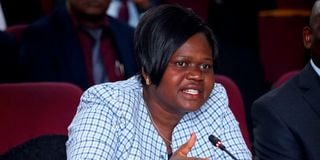Women’s rise to Kenya’s political parties' leadership not a favour

Homa Bay Governor Gladys Wanga. She is the new ODM chairperson.
What you need to know:
- When Raila Odinga, the party leader, convened a meeting to select replacements, women members immediately called for inclusion of their lot in the positions.
- They specifically asked that Gladys Wanga, the Homa Bay governor, be made one of the deputy party leaders, citing her performance in Parliament and the current position.
- One of them averred that women “have been the cog of the party,” hence deserve a reciprocal favour.
The vacancies in the top leadership of the Orange Democratic Movement (ODM) following the manoeuvred appointment of its two deputy party leaders, chairman and parliamentary leader to the Executive, thanks to the opportunistic rapprochement with the beleaguered Kenya Kwanza government, raises the issue of women in political leadership.
In this case, when Raila Odinga, the party leader, convened a meeting to select replacements, women members immediately called for inclusion of their lot in the positions.
They specifically asked that Gladys Wanga, the governor of Homa Bay County, be made one of the deputy party leaders, citing her performance in Parliament and the current position. They reminded the party, correctly, that the top leadership is and has always been held by men, which negates democracy and neglects the quality of women in the party.
In addition, one of them averred that women “have been the cog of the party,” hence deserve a reciprocal favour. They pleaded with Baba (Raila) to heed their call. He did and Wanga was elevated to the position of national chairperson, the first woman to hold the post in the party.
That done, the plea still raises fundamental questions. Why should women plead with an individual to hear their cries? The plea suggests, correctly, that Baba is the sole determinant of who ascends the leadership of the party.
This cannot be described as democratic, the middle name of the party, and sounds more like dictatorship, which shares the initial letter with “democratic”.
This pattern is observable in other political parties as well, perhaps with the exception of the National Rainbow Coalition Kenya, led by Martha Karua. They are owned by godfathers, the sole proprietors who make all the decisions to be implemented by their charges.
Members in the parties are, therefore, largely mere chattels and cheerleaders. If it were not so, the women would not be pleading for favours.
Why does it matter to be in the leadership of a political party? In Kenya, being in these positions puts one of your legs halfway into Parliament, the most lucrative income-generating activity in the country. It places women in the position as metaphorically captured by Unoka in Chinua Achebe’s Things Fall Apart, that the sun first shines on those who are standing before the ones sitting.
The posts make women among the former in the scramble for political goodies. They also accord occupants the opportunity to participate in making important decisions and determining party standpoints on various matters, including gender-sensitive legislation and women’s rights in general.
The women get a strategic chance to champion their unique concerns, what is called symbolic consequences in gender discourse, that those in influential positions are automatically expected to advocate gender equality.
This, unfortunately, feminises their work, making it appear that this is the sole reason they are put into those places. Be that as it may, it gains them mileage – the end justifies the means.
Moreover, being close to the owner of the party makes women privy to the inner workings and to raw power, even if it is delegated. As illustrated in Ayi Kwei Armah’s The Healers, those close to power are also powerful, usually as gatekeepers and brokers.
The intimate knowledge they access can be instrumental not only for their personal benefit but also that of fellow women, assuming that they practise the expected surrogacy.
It is also important that women occupy top leadership positions to showcase their leadership abilities and role model for their folk who wish to pursue political careers. These positions are avenues to the intricacies of political leadership and routes to knowledge, networks and financial and material resources engendered in them.
When making the plea, the ODM women were obviously alarmed by the fact that the minority leader position in the National Assembly was assigned to a man despite an unequivocal interest in the same by Suba North MP Millie Odhiambo. No one can begrudge her this interest.
Odhiambo is one of the senior-most ODM legislators, going by tenure. She is one of the most vocal, articulate, forceful and visible legislators nationwide, men and women combined. And she has an impressive legislative record going by the progressive bills she has sponsored, some of which have been enacted. Bypassing her is nothing but a perpetuation of men’s patriarchal entitlement.
Political parties need to realise that continuing to sideline women perpetuates the notion that they are second-class members. It also confirms, unfortunately, that party leaders’ often voiced support for gender equality amounts to mere lip service.
Hopefully, all political parties would see the sense in ensuring gender balance and treating the women members better and as equal shareholders, not just stakeholders.
The writer is a lecturer in Gender and Development Studies at South Eastern Kenya University ([email protected]).





